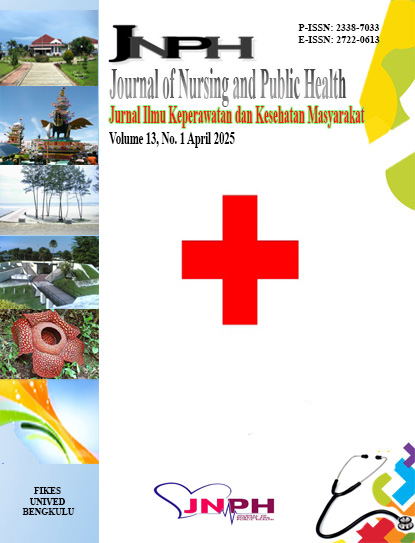FAKTOR PSIKOSOSIAL DAN KESEJAHTERAAN MENTAL PENGEMUDI OJEK ONLINE DI BENGKULU: STUDI MIXED-METHODS TENTANG BEBAN KERJA, DUKUNGAN SOSIAL, DAN DINAMIKA EKONOMI
Abstract
Penelitian ini bertujuan untuk mengidentifikasi pengaruh faktor psikososial terhadap kesejahteraan mental pekerja ojek online di Bengkulu, dengan fokus pada beban kerja, dukungan sosial, tekanan pelanggan, dan keseimbangan kehidupan kerja. Penelitian mixed-methods ini mengkaji faktor psikososial yang memengaruhi kesejahteraan mental pengemudi ojek online di Bengkulu, Indonesia. Data kuantitatif dari survei terhadap 100 pengemudi menunjukkan bahwa beban kerja berpengaruh negatif (β = -0,362, *p* < 0,01), sedangkan dukungan sosial berpengaruh positif (β = 0,423, *p* < 0,01) terhadap kesejahteraan mental. Tekanan pelanggan dan keseimbangan kerja-kehidupan tidak signifikan. Temuan kualitatif melalui wawancara mendalam dengan 10 partisipan mengungkap tekanan algoritmik (sistem penilaian tidak transparan, target harian tidak realistis) dan stigma sosial sebagai pemicu stres utama, diperparah oleh ketidakpastian ekonomi akibat penghasilan tidak stabil dan ketergantungan pada utang. Penelitian ini memperluas Teori Job Demands-Resources dengan memperkenalkan tekanan algoritmik sebagai tuntutan kerja baru dan kerentanan ekonomi sebagai mediator. Rekomendasi praktis mencakup reformasi platform (algoritma transparan, pembatasan beban kerja) serta kebijakan pemerintah (layanan kesehatan mental, perlindungan sosial). Integrasi temuan kuantitatif-kualitatif menegaskan pentingnya intervensi holistik yang menjangkau ketidakadilan sistemik dan penguatan dukungan komunitas untuk meningkatkan kesejahteraan mental pekerja ojek online.
Downloads
References
BPS Bengkulu. (2023). Statistik Kesejahteraan Rakyat Provinsi Bengkulu.
Cohen, S., & Wills, T. A. (1985). Stress, social support, and the buffering hypothesis. Psychological Bulletin, 98(2), 310–357. https://doi.org/10.1037/0033-2909.98.2.310
Creswell, J. W., & Creswell, J. D. (2018). Research design: Qualitative, quantitative, and mixed methods approaches. Sage.
Hobfoll, S. E. (1989). Conservation of resources: A new attempt at conceptualizing stress. American Psychologist, 44(3), 513–524.
International Labour Organization. (2023). World Employment and Social Outlook: The role of digital labour platforms.
Nurhayati, S. R., & Putra, A. (2021). Social stigma and self-esteem among online motorcycle taxi drivers in Indonesia. Asian Journal of Social Psychology, 24(3), 312-327.
Rahman, M., Kundu, S., & Roy, S. (2022). Algorithmic control and mental health of gig workers. New Technology, Work and Employment, 37(1), 1-20.
Sharma, R. et al. (2022). Mental health challenges among gig workers in developing economies. Journal of Occupational Health, 64(3), 112-125.
Woodcock, J., & Graham, M. (2020). The gig economy: A critical introduction. Polity Press.

An author who publishes in the Journal of Nursing and Public Health agrees to the following terms:
Author retains the copyright and grants the journal the right of first publication of the work simultaneously licensed under the Creative Commons Attribution-ShareAlike 4.0 License that allows others to share the work with an acknowledgement of the work's authorship and initial publication in this journal
Submission of a manuscript implies that the submitted work has not been published before (except as part of a thesis or report, or abstract); that it is not under consideration for publication elsewhere; that its publication has been approved by all co-authors. If and when the manuscript is accepted for publication, the author(s) still hold the copyright and retain publishing rights without restrictions. For the new invention, authors are suggested to manage its patent before published. The license type is CC-BY-SA 4.0.
Journal of Nursing and Public Health is licensed under a Creative Commons Attribution-ShareAlike 4.0 International License.
You are free to:
Share — copy and redistribute the material in any medium or format
Adapt — remix, transform, and build upon the material
for any purpose, even commercially.
The licensor cannot revoke these freedoms as long as you follow the license terms.









